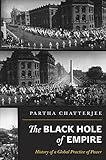The Black Hole of Empire : History of a Global Practice of Power / Partha Chatterjee.
Material type: TextPublisher: Princeton, NJ : Princeton University Press, [2012]Copyright date: ©2012Edition: Course BookDescription: 1 online resource (440 p.) : 23 halftones. 5 line illusContent type:
TextPublisher: Princeton, NJ : Princeton University Press, [2012]Copyright date: ©2012Edition: Course BookDescription: 1 online resource (440 p.) : 23 halftones. 5 line illusContent type: - 9780691152011
- 9781400842605
- 954/.14029 23
- DS465 .C53 2012
- online - DeGruyter
- Issued also in print.
| Item type | Current library | Call number | URL | Status | Notes | Barcode | |
|---|---|---|---|---|---|---|---|
 eBook
eBook
|
Biblioteca "Angelicum" Pont. Univ. S.Tommaso d'Aquino Nuvola online | online - DeGruyter (Browse shelf(Opens below)) | Online access | Not for loan (Accesso limitato) | Accesso per gli utenti autorizzati / Access for authorized users | (dgr)9781400842605 |
Browsing Biblioteca "Angelicum" Pont. Univ. S.Tommaso d'Aquino shelves, Shelving location: Nuvola online Close shelf browser (Hides shelf browser)

|

|

|

|

|

|

|
||
| online - DeGruyter Building the Judiciary : Law, Courts, and the Politics of Institutional Development / | online - DeGruyter Three Worlds of Relief : Race, Immigration, and the American Welfare State from the Progressive Era to the New Deal / | online - DeGruyter Pogrom in Gujarat : Hindu Nationalism and Anti-Muslim Violence in India / | online - DeGruyter The Black Hole of Empire : History of a Global Practice of Power / | online - DeGruyter Melancholia of Freedom : Social Life in an Indian Township in South Africa / | online - DeGruyter The New Arab Man : Emergent Masculinities, Technologies, and Islam in the Middle East / | online - DeGruyter Human Rights as Politics and Idolatry / |
Frontmatter -- Contents -- Illustrations -- Preface -- CHAPTER ONE. Outrage in Calcutta -- CHAPTER TWO. A Secret Veil -- CHAPTER THREE. Tipu's Tiger -- CHAPTER FOUR. Liberty of the Subject -- CHAPTER FIVE. Equality of Subjects -- CHAPTER SIX. For the Happiness of Mankind -- CHAP TER SEVEN. The Pedagogy of Violence -- CHAPTER EIGHT. The Pedagogy of Culture -- CHAPTER NINE. Bombs, Sovereignty, and Football -- CHAPTER TEN. The Death and Everlasting Life of Empire -- Notes -- References -- Index
restricted access online access with authorization star
http://purl.org/coar/access_right/c_16ec
When Siraj, the ruler of Bengal, overran the British settlement of Calcutta in 1756, he allegedly jailed 146 European prisoners overnight in a cramped prison. Of the group, 123 died of suffocation. While this episode was never independently confirmed, the story of "the black hole of Calcutta" was widely circulated and seen by the British public as an atrocity committed by savage colonial subjects. The Black Hole of Empire follows the ever-changing representations of this historical event and founding myth of the British Empire in India, from the eighteenth century to the present. Partha Chatterjee explores how a supposed tragedy paved the ideological foundations for the "civilizing" force of British imperial rule and territorial control in India. Chatterjee takes a close look at the justifications of modern empire by liberal thinkers, international lawyers, and conservative traditionalists, and examines the intellectual and political responses of the colonized, including those of Bengali nationalists. The two sides of empire's entwined history are brought together in the story of the Black Hole memorial: set up in Calcutta in 1760, demolished in 1821, restored by Lord Curzon in 1902, and removed in 1940 to a neglected churchyard. Challenging conventional truisms of imperial history, nationalist scholarship, and liberal visions of globalization, Chatterjee argues that empire is a necessary and continuing part of the history of the modern state.Some images inside the book are unavailable due to digital copyright restrictions.
Issued also in print.
Mode of access: Internet via World Wide Web.
In English.
Description based on online resource; title from PDF title page (publisher's Web site, viewed 30. Aug 2021)


